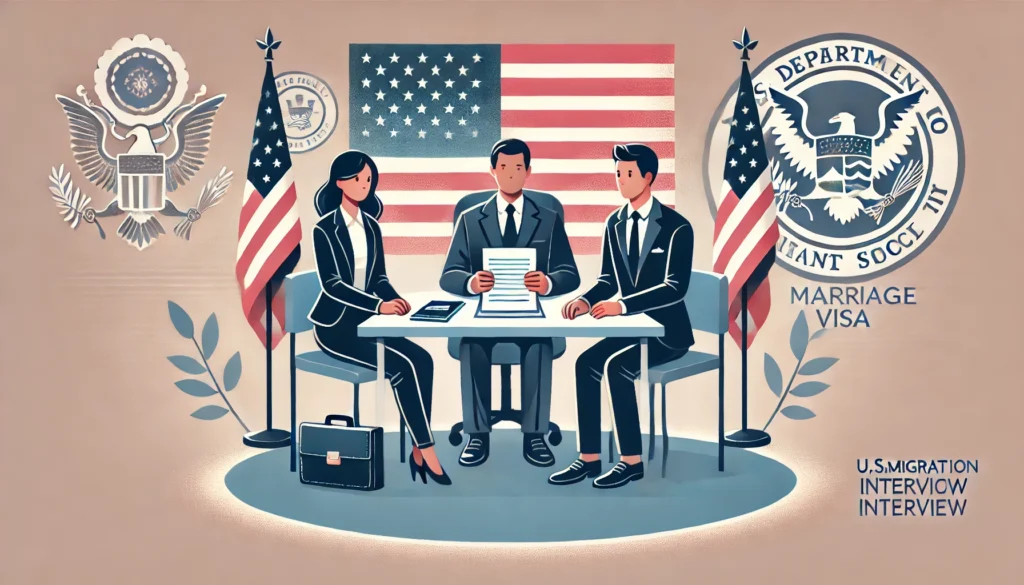Introduction
Applying for a USA marriage visa can be a complex process. While it offers a pathway to permanent residency, even small errors can lead to delays, additional scrutiny, or outright denial of the application. Understanding the common mistakes people make during this process can help ensure a smoother and more successful journey. This article outlines ten frequent mistakes to avoid when applying for a USA marriage visa and provides tips on how to navigate the process effectively.
1. Submitting Incomplete or Incorrect Forms
Why It Matters:
Immigration forms such as Form I-130 (Petition for Alien Relative) or Form I-485 (Application to Adjust Status) require thorough and accurate completion. Missing information or errors can result in rejection or delays. These forms are the foundation of your visa application, and even minor mistakes can lead to additional scrutiny, processing delays, or outright denial.
How to Avoid:
- Double-check all forms before submission, ensuring every question is answered completely and correctly.
- Seek help from an immigration attorney or consultant to verify accuracy and compliance with USCIS requirements.
- Use the most up-to-date versions of the forms available on the USCIS website, as older versions may no longer be accepted.
- Review instructions for each form carefully to ensure you meet all specific requirements, such as including the appropriate supporting documents.
2. Failing to Provide Sufficient Evidence of a Genuine Relationship
Why It Matters:
USCIS closely examines the legitimacy of the marriage to prevent fraud. Insufficient evidence can raise red flags and result in prolonged investigations or denials. Demonstrating a genuine relationship is crucial to convincing immigration officials that your marriage is not solely for immigration purposes.
How to Avoid:
- Submit a comprehensive portfolio of evidence, including joint financial documents, photographs from various life events, travel records, and affidavits from friends or family attesting to the authenticity of your relationship.
- Include additional evidence, such as emails, text messages, social media interactions, and proof of shared living arrangements, to provide a fuller picture of your relationship.
- Be consistent in your story during interviews and written statements. Any discrepancies between your documents and interview responses can lead to doubts about the validity of your relationship.
- Organize your evidence clearly and professionally, labeling each piece to correspond with specific aspects of your relationship, such as milestones or shared commitments.
3. Missing Deadlines
Why It Matters:
Failing to meet deadlines for submitting forms, responding to Requests for Evidence (RFEs), or attending interviews can jeopardize your case. These missed deadlines can lead to delays in processing, potential denials, or the need to restart the entire process, costing valuable time and resources. Staying organized and proactive is essential to keeping your case on track.
How to Avoid:
- Keep a detailed calendar or digital planner with all deadlines clearly marked, including submission dates for forms, medical examinations, and interview appointments.
- Set reminders on your phone or email to alert you of upcoming deadlines, ensuring you have ample time to prepare.
- Respond promptly to any USCIS correspondence, such as RFEs, by gathering and submitting the requested documents as quickly as possible.
- Work with a professional or legal advisor who can help you track deadlines and ensure that all submissions meet the required timelines.
- Regularly check the status of your case on the USCIS website to stay informed about any updates or new deadlines.
4. Not Meeting Financial Sponsorship Requirements
Why It Matters:
The U.S. citizen spouse must meet financial thresholds outlined in the Affidavit of Support (Form I-864) to prove they can support the immigrant spouse. Failure to meet these requirements can result in a denial of the application, as the government needs assurance that the immigrant spouse will not become a public charge.
How to Avoid:
- Ensure your income is at least 125% of the federal poverty level, based on your household size, by checking the latest poverty guidelines published by USCIS.
- If your income is insufficient, consider using a joint sponsor who meets the financial requirements and is willing to provide an additional Affidavit of Support.
- Submit recent tax returns, pay stubs, employment verification letters, and proof of assets (such as savings or property ownership) to demonstrate your financial stability.
- Keep detailed financial records readily available, as additional documentation may be requested by USCIS during the process.
- Consult with an immigration attorney if you are unsure about meeting the financial requirements or if your income situation is complex, such as being self-employed or having fluctuating income.
5. Providing Inconsistent Information
Why It Matters:
Inconsistencies in application forms, interviews, or supporting documents can lead to suspicion and additional scrutiny. Discrepancies in information may raise red flags, prompting USCIS to question the authenticity of your application or your relationship. This can result in delays, additional requests for evidence, or even outright denial of the visa.
How to Avoid:
- Review all submitted information for accuracy, including names, dates, and other critical details on forms and supporting documents.
- Practice for interviews by reviewing common questions related to your relationship and immigration application. Ensure that both you and your spouse are consistent in your responses.
- Keep copies of all submitted forms for reference, so you can double-check answers and ensure consistency during future communications or interviews.
- Provide supporting evidence that aligns with your statements, such as travel itineraries, photographs, and financial records, to corroborate your application.
- If you identify any inconsistencies after submission, address them promptly by submitting corrections or additional clarifications through appropriate channels.
6. Ignoring the Importance of the Medical Examination
Why It Matters:
The required medical examination must be conducted by a USCIS-approved physician. Omitting or delaying this step can halt your application process. Additionally, incomplete or incorrect medical forms can lead to requests for additional evidence, further delaying approval.
How to Avoid:
- Schedule your medical exam early in the process to avoid last-minute complications or delays.
- Research and select a USCIS-approved physician in your area to ensure compliance with immigration requirements.
- Ensure the doctor submits the results in the correct sealed envelope, as opening the envelope may invalidate the results.
- Keep personal copies of your medical records for reference, including vaccination history, as these may be required for future updates or adjustments.
- Follow any instructions given by the physician, such as completing additional tests or treatments if needed, to meet USCIS health requirements.
7. Failing to Attend Scheduled Interviews
Why It Matters:
The visa process often requires interviews to verify the relationship and application details. Missing an interview can result in denial.
How to Avoid:
- Confirm the interview date and location well in advance.
- Arrive early and bring all required documentation.
- Reschedule promptly if you cannot attend due to an emergency.
8. Relying on Outdated or Incorrect Information
Why It Matters:
Immigration laws and procedures frequently change. Relying on outdated advice can result in errors.
How to Avoid:
- Use official resources like the USCIS website for updates.
- Consult immigration attorneys familiar with current regulations.
- Avoid relying solely on online forums or anecdotal advice.
9. Overlooking Travel Restrictions
Why It Matters:
If you leave the U.S. while your adjustment of status application is pending without advance parole, your application may be considered abandoned.
How to Avoid:
- Apply for advance parole if you need to travel.
- Avoid unnecessary travel until your application is approved.
10. Failing to Seek Professional Help When Needed
Why It Matters:
Immigration laws are complex, and small mistakes can have significant consequences. Professional guidance can help you avoid costly errors.
How to Avoid:
- Hire a qualified immigration attorney for your case.
- Consult experts for advice on documentation and procedures.
- Regularly communicate with your legal representative to stay informed.
Conclusion
Applying for a USA marriage visa is a significant and transformative step toward building a life with your spouse in the United States. This process is not just about completing paperwork but about showcasing the genuine nature of your relationship and your commitment to building a future together. By being proactive, well-prepared, and mindful of common pitfalls, you can ensure a smoother and more efficient application journey.
Avoiding mistakes such as submitting incomplete forms, missing deadlines, or failing to provide strong evidence of your marriage’s authenticity can greatly enhance your chances of success. Organizing your documentation meticulously, responding promptly to USCIS requests, and seeking professional legal advice when needed are critical steps in this journey. Immigration laws and procedures can be intricate and ever-evolving, making it essential to stay informed and adaptable.
Moreover, the visa process offers an opportunity to strengthen your partnership by working collaboratively through the challenges. From gathering evidence to attending interviews, each step reflects your shared commitment and determination. While the path may seem daunting at times, careful preparation and a positive mindset can make a significant difference.
Remember, every successful application requires patience, thoroughness, and a clear understanding of the requirements. With dedication and attention to detail, you and your spouse can confidently navigate this process, secure permanent residency, and embark on an exciting new chapter of your life together in the United States.


